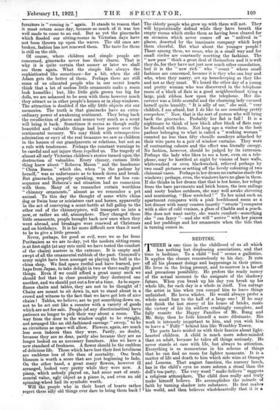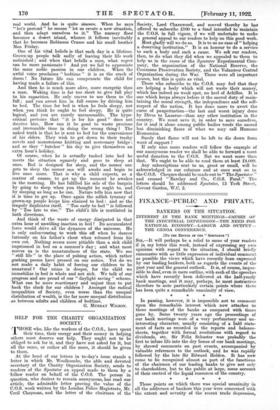BEDTIME.
THERE is one time in the childhood of us all which has nothing but displeasing associations, and that time is bedtime. To a child " bed " seems a guillotine. It applies the closure remorselessly to his day. It cuts off all his pleasant doings and happenings in their prime. He lives in the living present, and to-morrow is a far-off and precarious possibility. He prefers the ready money of the actual moment to the assignats of the shadowy future. When you break up his day you break up his whole life, for each day is a whole in itself. You outrage the artist in him when you compel him to leave things unfinished. He loves wholes. He would always prefer a whole small bun to the half of a large one ! If he may not finish the last storey of his house of bricks, make the victory of his tin soldiers crushingly complete, and fully reunite the Happy Families of Mr. Bung and Bfi. Snip, then he feels himself a mere dilettante. His work is intensely impOrtant to him, and you wish him to leave a " Folly " behind him like Wembley Tower.
The poets have misled us with their fancies about light- hearted children. A child is much more sober-minded than an adult, because he takes all things seriously. He never stands at ease with life, but always to attention. Everything is so momentous in his scheme of things that he can find, no room for lighter moments.' It is a matter of life and death to him which side wins at Oranges and Lemons. That august function, the nursery lunch, has in the child's eyes no more solemn a ritual than the doll's tea-party. The very word " make-believe " suggests a religious atmosphere. The child does really and truly make himself believe. He . accomplishes the miracle of faith by turning shadow into substance. He first makes his world, and then believes wholeheartedly that it is a real world. And he is quite sincere. When he says "let's pretend" he means "let us create a new situation, and then adapt ourselves to it." The nursery floor becomes a desert island, whence it follows inevitably that he becomes Robinson Crime and his small brother Man Friday.
One of his vital beliefs is that each day is a lifetime. Grown-up people talk sadly of leaving their life work unfinished ; and when that befalls a man, what regret can be more passionate ? And yet we fail to appreciate the same noble passion in our children. When the awful voice proclaims " bedtime " it is as the crack of doom ! No future life can compensate the child for having made a failure of this. And then he is much more alive, more energetic than a man. Waking time is far too short to give full play to- his capacities. He only craves to use them to the full ; and you arrest him in full course by driving him to bed. The time for bed is when he feels sleepy, not when you think he ought to feel sleepy. He is quite logical, and you are merely unreasonable. The hypo- critical pretence that "it is for his good" does not deceive him. How can it be good to waste precious and irrevocable time in doing the wrong thing ? The naked truth is that he is sent to bed for the convenience of his elders. They wish to get down to their trashy novels and monotonous knitting and mercenary bridge : and so they " butcher " his day to give themselves an extra hour's holiday.
Of course, when he is actually tucked into bed he meets the situation squarely and goes to sleep at once. Bed is designed for sleep, and the sooner one gets to sleep the sooner one will awake and begin to live once more. That is why a child expects, as a matter of course, to get up the moment he awakes in the morning. He has fulfilled his side of the bargain by going to sleep when you thought he ought to, and by sleeping as long as he can. Nature tells him now that it is time to get up. Once again the selfish tyranny of grown-up people keeps him -chained to bed : and so the tragedy duplicates itself. "Too early to bed" is followed by Too late to rise." The child's life is mutilated in both directions.
And think of the waste of energy dissipated in that extra hour of unwilling inaction in bed ! Its accumulated force would drive all the dynamos of the universe. He is only endeavouring to work -this off when he dances furiously on his father's chest when released from his own cot. Nothing seems more pitiable than a sick child imprisoned in bed on a summer's day ; and what most moves 11B is the unnaturalness of the state. We see "still life" in the place of pulsing action, which rather gushing poems have pressed on our notice. Yet do we not make a daily habit of forcing our children to be unnatural ? Our crime is deeper, for the child we immobilize in bed is whole and not sick. We talk of our progress and are proud of our "daylight saving" scheme. What can be more reactionary and 'unjust than to put back the clock for our children ? Amongst the radical inequalities of Society, even worse than the unequal distribution of wealth, is the far more unequal distribution as between adults and children of bedtime.
G. MURRAY WILt3ON.



































 Previous page
Previous page